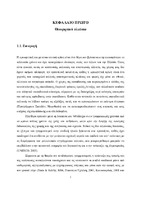Χρήση εικονογραφημένου εντύπου για εκμάθηση της ελληνικής γλώσσας σε αλλοδαπά παιδιά πρώιμης σχολικής ηλικίας
The use of picture book reading for teaching the greek language to early-school children

Προβολή/
Λέξεις κλειδιά
Γραμματισμός ; Διγλωσσία ; Πρώιμη σχολική ηλικία ; Διαπολιτισμική εκπαίδευση ; Παράλληλες δομές στήριξης ; Ένταξη ; Μετανάστες ; Πρόσφυγες ; Εικονογραφημένο έντυποΠερίληψη
Αντικείμενο της παρούσας διπλωματικής εργασίας αποτελεί η μελέτη των πρακτικών και των
μεθόδων διδασκαλίας, που υιοθετεί το επιστημονικό προσωπικό στις εκπαιδευτικές δομές
προσφύγων και μεταναστών για την εξοικείωση των παιδιών πρώιμης σχολικής ηλικίας με
την ελληνική γλώσσα και τον γραμματισμό. Συγκεκριμένα, εστιάζουμε στο εικονογραφημένο
έντυπο ως εργαλείο για την εξοικείωση των παιδιών ηλικίας 5-7 ετών με την ελληνική
γλώσσα και τον γραμματισμό. Το δείγμα της έρευνας αποτέλεσαν έξι εκπαιδευτές που
εργάζονταν την περίοδο της έρευνας (Ιούνιος 2018) σε εκπαιδευτικά πλαίσια με παιδιά
προσφύγων και μεταναστών. Πραγματοποιήθηκαν ημιδομημένες συνεντεύξεις και η
ανάλυση των δεδομένων έγινε με την τεχνική της ανάλυσης περιεχομένου. Τα αποτελέσματα
της έρευνας ήταν στον μεγαλύτερο βαθμό τους όμοια, παρά την ανομοιομορφία του
δείγματος. Όλοι οι συνεντευξιαζόμενοι χρησιμοποιούν το εικονογραφημένο έντυπο στους
φορείς που δραστηριοποιούνται, προκειμένου να επιτύχουν συγκεκριμένους στόχους, όπως
επίσης και να διαμορφώσουν εκπαιδευτική πολιτική. Στις περισσότερες περιπτώσεις
προκύπτει ότι η εξοικείωση με την ελληνική γλώσσα είναι έμμεσος στόχος, ενώ
προτεραιότητα τίθεται στην κοινωνικο-συναισθηματική έκφραση και την ηθικοπλαστική
διαμόρφωση των παιδιών. Οι εκπαιδευτικές πρακτικές που ακολουθούνται από όλους τους
εκπαιδευτές είναι αόρατες και στόχος είναι η εκμάθηση της ελληνικής γλώσσας με παιγνιώδη
μορφή. Στο κομμάτι της διερεύνησης της επαφής των εκπαιδευτών με τους γονείς,
διαπιστώθηκε ότι υπάρχουν διάφορα εμπόδια, που δυσχεραίνουν την επικοινωνία των
εκπαιδευτών με τις οικογένειες των παιδιών για θέματα που αφορούν την μαθησιακή τους
πορεία και ουσιαστικά δεν μπορεί να χτιστεί σχέση συνεργασίας προς την ίδια κατεύθυνση.
Επίσης, η μαθησιακή πορεία των παιδιών της έρευνας εξαρτάται από διάφορους παράγοντες,
v
όπως για παράδειγμα από την ηλικία τους, την προηγούμενη σχολική τους εμπειρία, το
πολιτισμικό τους υπόβαθρο, την ψυχοσυναισθηματική τους κατάσταση, την χώρα
προορισμού κλπ. Λόγω, λοιπόν, των δεδομένων συνθηκών, δεν μπορεί να διασφαλιστεί η
ομαλή ένταξη των παιδιών στο κοινωνικό και σχολικό πλαίσιο, αλλά επαφίεται στην στήριξη
των φορέων (διεθνών, δημοσίων και ιδιωτικών) και στο έργο των εκάστοτε εκπαιδευτών.

